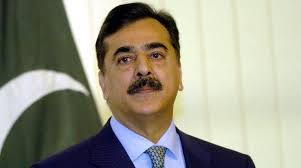ISLAMABAD, Apr 25 (APP): Chairman Senate Syed Yousaf Raza Gilani on Friday emphasised the need for collective global action to address pressing challenges such as climate change, renewable energy, and water scarcity, calling for joint solutions through dialogue and cooperation.
Speaking at a reception hosted in honor of a significant international diplomatic and parliamentary achievement, Gilani welcomed senators, provincial assembly speakers, and foreign dignitaries.
He described the occasion as a celebration of a remarkable milestone for Pakistan’s parliamentary diplomacy.
Gilani highlighted his unanimous appointment as the founding Chairman of the International Senate Conference (ISC), terming it a powerful recognition of Pakistan’s commitment to promoting global dialogue and mutual respect. “This development marks a significant moment in our diplomatic journey and opens the door to new opportunities for Pakistan in the current geopolitical landscape,” he said.
He said that the ISC would serve as a unique platform to strengthen multilateral, inter-parliamentary, and diplomatic ties, while also promoting trade and investment. “It is a forum designed to address global challenges that cross borders—through cooperation, not conflict,” he added.
As part of this initiative, Gilani also announced the formation of a strategic partnership with Korea Water Resources Corporation to develop climate-smart technologies and improve sustainable water resource management in Pakistan. “This partnership will boost our national capacity in climate resilience and create avenues for technological exchange,” he said.
Reflecting on his tenure as former Prime Minister and current Senate Chairman, Gilani stressed the importance of proactive diplomacy and strong inter-parliamentary relations. These, he said, were essential tools for improving Pakistan’s image abroad and highlighting its role as a responsible and forward-looking state.
“This vision is linked to our nation’s great diplomatic legacy laid down by the founding father of Pakistan, Quaid-e-Azam Muhammad Ali Jinnah, Mohtarma Fatima Jinnah, Shaheed Zulfikar Ali Bhutto, and Shaheed Mohtarma Benazir Bhutto. Quaid-e-Azam founded Pakistan’s foreign policy on principles of justice, equality, and respect for international law—principles that still form part of our diplomatic strategy today. Likewise, Mohtarma Fatima Jinnah played an active role in forcefully defending the country’s interests on international platforms. Carrying forward this vision, Shaheed Zulfikar Ali Bhutto and Shaheed Mohtarma Benazir Bhutto highlighted the principles of equality and mutual respect globally” he said.
Gilani also underlined Pakistan’s growing engagement in international parliamentary forums, including the Asian Parliamentary Assembly (APA), Commonwealth Parliamentary Association, and the Inter-Parliamentary Union (IPU).
He praised Pakistan’s support for Azerbaijan’s leadership of the Non-Aligned Movement Parliamentary Network (NAM PN), which, he said, further strengthened Pakistan’s ties with Central Asia and enhanced its diplomatic credibility.
Outlining his goals for the ISC, Gilani said, “My vision is to transform the ISC into a platform for serious debate and real solutions. The Seoul Declaration serves as a guiding roadmap for global peace, cooperation, and shared prosperity.”
He expressed hope that the ISC would unite nations in promoting sustainability, technological exchange, and fair resource distribution. “Our goal is to green our economies together, share renewable energy innovations, and ensure fair access to water,” he said.
He added that successful diplomacy paves the way for growth in trade, investment, and tourism. Strengthening international forums, he said, would also enhance initiatives like CPEC, food security, artificial intelligence, and agricultural partnerships.
“The future belongs to those who are prepared,” he concluded. “Our youth, entrepreneurs, and diplomats must be ready to seize the opportunities that global cooperation can bring.”

